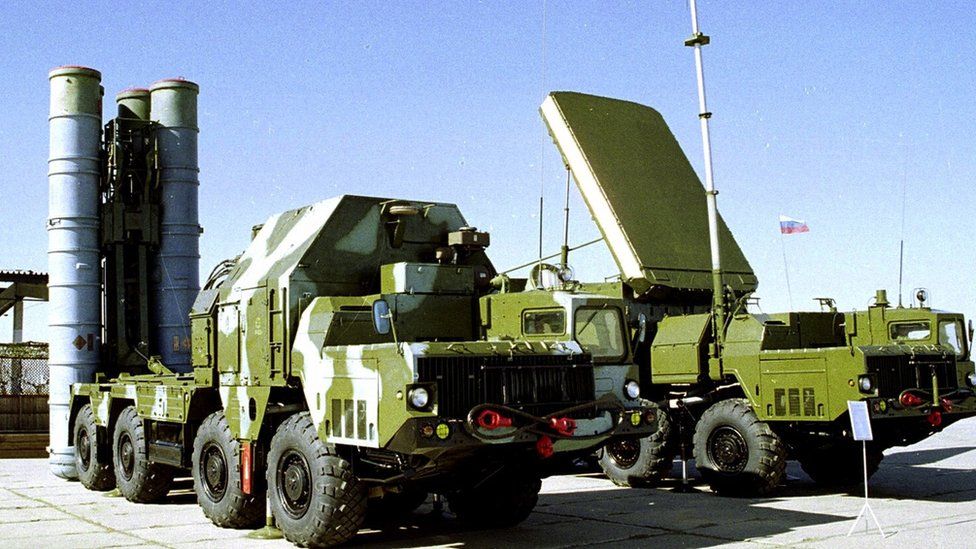Syria conflict: Russia sends missile system to Tartus base
- Published

Russia has confirmed it has sent an S-300 air defence missile system to its naval base in Syria's port of Tartus.
Defence ministry spokesman Igor Konashenkov said the purpose of the system was to guarantee the security of the base from the air.
The move comes amid growing tension with the West. On Monday, the US halted talks with Russia on trying to co-ordinate air strikes against jihadists.
A ceasefire brokered by Washington and Moscow collapsed last month.
"Let me remind you that the S-300 is a purely defensive system and poses no threat to anyone," Maj-Gen Konashenkov said.
"It is unclear why the deployment of the S-300 caused such alarm among our Western partners."
The spokesman said the system was similar to one earlier deployed at sea on the cruiser Moskva.
Analysis: Jonathan Marcus, BBC defence and diplomatic correspondent
The deployment of S-300 surface-to-air missiles (known to Nato as the SA-23) to Russia's naval base at Tartus is the first time Russia has deployed the system outside its own territory. It joins another sophisticated anti-aircraft system, the S-400, already in place at the Russian air base near Latakia.
The S-300 is highly mobile - its radars, launchers and command systems carried on a number of vehicles. It can be mounted on a heavy wheeled launcher as well.
It is one of the most lethal area defence systems ever developed intended to engage aircraft, cruise and ballistic missiles.
Its deployment indicates that Russia is significantly bolstering its air defences in Syria. This is a clear signal to Washington that there would be a heavy price to pay should the US be tempted to intervene in some way against Russian or Syrian operations.
How the S-300 missile system works
Fox News reported earlier quoting unnamed US officials that the system had been deployed at the weekend.
In addition to the Tartus naval base, Russia uses the Hmeimim air base near the Syrian coastal city of Latakia.
Last year, Moscow deployed the more advanced S-400 system there as it began conducting air strikes in Syria.
On Monday, the US said it was suspending talks with Russia over Syria, accusing Moscow of having "failed to live up" to its commitments under the ceasefire deal.
Washington blamed Russia and the Syrian government for intensifying attacks against civilians, including rebel-held areas in eastern Aleppo.
State department spokesman John Kirby said Moscow and Syrian President Bashar al-Assad's troops had been "targeting critical infrastructure such as hospitals and preventing humanitarian aid from reaching civilians in need, including through the 19 September attack on a humanitarian aid convoy".
Moscow strongly denies involvement of its own or Syrian planes in the deadly aid convoy strike, and says the incident was caused by fire on the ground and not by an air strike.
Hundreds of people, including children, have died since government forces launched an offensive to take full control of Aleppo after the week-long truce lapsed.
Responding to the suspension of the talks, Russia said it regretted the US move, accusing Washington of trying to shift blame for the collapse of the ceasefire.
"Washington simply did not fulfil the key condition of the agreement to improve the humanitarian condition around Aleppo," Russian foreign ministry spokeswoman Maria Zakharova said.
She also said that the US had failed to divide jihadist groups in Syria from the moderate opposition.
Russia and the US were due to convene in Geneva to try to co-ordinate air strikes against jihadist groups, but American officials were told to return home.
The US also said that it would withdraw personnel "that had been dispatched in anticipation of the possible establishment of the Joint (US-Russian) Implementation Centre".
However, the two sides would keep talking about counter-terrorism operations in Syria to avoid unnecessary clashes.